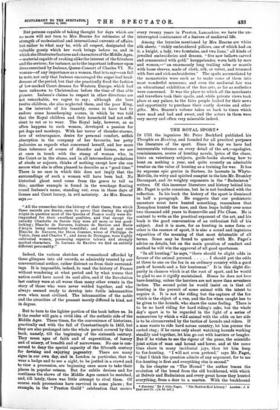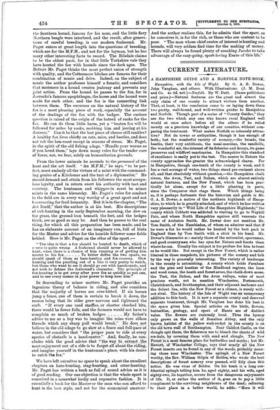THE ROYAL SPORT.* IN 1781 the ingenious Mr. Peter Beckford
published his Thoughts on Hunting, and founded for all practical purposes the literature of the sport. Since his day we have had innumerable volumes on every detail of the art,—apologies, reminiscences, scores of hunting novels, lyrics of the chase, hints on veterinary subjects, guide-books showing how to hunt on nothing a year, and quite recently an admirable treatise on the value of hunting as a training for war. It has its supreme epic genius in Surtees, its laureate in Whyte. Melville, its witty and spirited essayist in the late Mr. Bromley Davenport, and its weighty exponents in the " Badminton " writers. Of this immense literature and history behind him Mr. Paget is quite conscious, but he is not burdened with the reflection. In his book the history of the sport is dismissed in half a paragraph. He suggests that our prehistoric ancestors must have hunted something, remembers that Xenophon hunted the hare, and then leaps boldly over some two thousand odd years to Somerville and The Chase. He is content to write as the practical exponent of the art, and his book is the good conversation of an enthusiast full of his subject. And it is more, for as hunting in some form or other is the essence of sport, it is also a sound and ingenious exposition of the meaning of that most debateable of all terms. Some may be found to quarrel with Mr. Paget's advice on details, but on the main question of conduct and method he will win the approval of all good sportsmen.
"In all hunting," he says, "there should be slight odds in
favour of the animal pursued. I should put the odds at three to one on the fox in an ordinary country with a good pack of hounds and a fair huntsman." It is this slight dis- parity in chances which is at the root of sport, and he would be glad to see it rigidly maintained. Hence he does not love hare-hunting, unless the harriers are not more than seventeen inches. The second point he would insist on is that all hunting is the pursuit of some animal with the intent to acquire it. It is not the riding but the capture of the fox which is the object of a run, and the fox when caught has to be given to the hounds, who share the same feeling. There is to be no hard riding for hard riding's sake, but the whole day's sport is to be regarded in the light of a series of manceuvres by which a wild animal with the odds on her side is to be circumvented by the tactics of hounds and riders. If a man wants to ride hard across country, let him pursue the carted stag ; if he cares only about watching hounds working steadily and together, let him go out with harriers or beagles. But if he wishes to see the rigour of the game, the scientific joint action of m.an and hound and horse, and at the same time share in many incidental joys, then let him keep to fox-hunting. "I will not even pretend," says Mr. Paget, "that I think the question admits of any argument, for to me fox-hunting is first and everything else is second."
In his chapter on "The Hound" the author traces the evolution of the breed from the old buckhound, with which at Belvoir and Badminton and every great house they hunted everything, from a deer to a marten. With the buckhound
H - By J. Otho Paget. "The Haddon Hall Library." London : J. Id
the Southern hound, famous for his nose, and the little fiery Northern beagle were interbred, and the result, after genera- tions of careful breeding, is our modern foxhound. Mr.
Paget enters at great length into the questions of breeding, which are for the M.P.H., and not for the layman, but he has many other interesting facts to record. The Bilsdale claims to be the oldest pack, for in that little Yorkshire vale they have hunted the fox with hounds since the dark ages. The Belvoir Mr. Paget thinks the most perfect union of strength with quality, and the Cottesmore bitches are famous for their combination of music and drive. Indeed, on the subject of music the author professes himself a fanatic, and considers that muteness in a hound creates jealousy and prevents any joint action. From the hound he passes to the fox, for in Jormcks's famous apophthegm, the horse and the hound were made for each other, and the fox is the connecting link between them. The excursus on the natural history of the fox is a most pleasing piece of work, especially the account of the dealings of the fox with the badger. The curious question is raised of the origin of the hatred of rooks for the fox. He can do them little harm, yet a "beaten fox will be followed for miles by rooks, mobbing him and jeering at his distress!' Can it be that the lost piece of cheese still rankles?
A healthy fox lives chiefly on rats, mice, and beetles, and does not rob the hen-roost except in seasons of stress. Mr. Paget, in the spirit of the old fishing adage, "Handle your worms as if you loved them," lays down many rules for the tender care of foxes, not, we fear, solely on humanitarian grounds.
From the lower animals he ascends to the personnel of the hunt and the art itself. "An M.P.H.," he says, "to be per- fect, must embody all the virtues of a saint with the command- ing genius of a Kitchener and the tact of a diplomatist." He
should demand and attain from his followers the most scrupu- lous loyalty, and in return exert his authority with tact and
courtesy. The huntsman and whipper-in must be minor saints in the same hierarchy. Mr. Paget's rules for conduct in the field are in every way worthy of a great sport and not too exacting for frail humanity. But it is in the chapter, "The Art Itself," that the author is at his best. His descriptions of cub-hunting in the early September morning, the dew on the grass, the ground iron beneath the feet, and the hedges thick, are as good as may be. And then he passes to the real thing, for which all this preparation has been made, and he has an elaborate account of an imaginary run, full of hints for the Master and advice for the humble follower some fields behind. Here is Mr. Paget on the ethos of the sport :—
"The idea is that a fox should he hunted to death, which of curse is quite wrong. A foxhound should never be allowed to hunt, when there is a chance of him running or of getting him
nearer to his fox To better define the two sports, we should speak of them as hare-hunting and fox running. Slow hunting and the puzzling out of a line is very pretty to watch, but those who want to see it should go out with harehounds, and not wish to debase the foxhound's character. The principle of fox-hunting is to get away after your fox as quickly as you can, and to use every means in your power to keep near him.'
In descending to minor matters Mr. Paget provides an ingenious theory of balance in riding, and also considers that the majority of horses are over-bitted. If six horses jump a fence, one of them is certain to break it down, the reason being that its rider grew nervous and tightened the curb. "If every one used snaffles, or shorter checked bits, there would be fewer falls, and the farmers would not have to complain so much of broken hedges. . . . . My father's advice to me as a boy was to imagine the reins were silken threads which any sharp pull would break." He does not believe in the old adage to go slow at a fence and full-pace at water, but considers that "the proper pace to ride at every species of obstacle is a band-canter." And, finally, he con- cludes with the good advice that ," the way to extract the most enjoyment out of a ride is to forget all about the riding, and imagine yourself in the huntsman's place, with his desire to catch the fox."
We have left ourselves no space to speak about the excellent chapters on hare-hunting, stag-hunting, and otter-hunting. Mr. Paget has written a book as full of sound advice as it is of good reading. Our one objection is that the whole sport is conceived in a somewhat lordly and expensive fashion. It is essentially a book for the Master or the man who can afford to hunt in the best style, and not for the economical amateur. And the author realises this, for he admits that the sport, as he conceives it, is for the rich, or those who are content to be poor. "The man whose chief centre of interest is hunting and hounds, will very seldom find time for the making of money. There will always be found plenty of sneaking Jacobs to take advantage of the easy-going, sport-loving Esans of this life."



















































 Previous page
Previous page